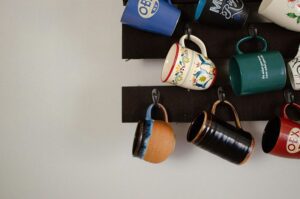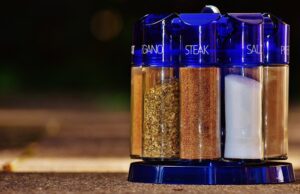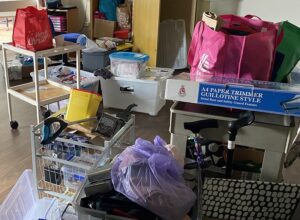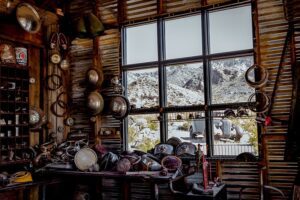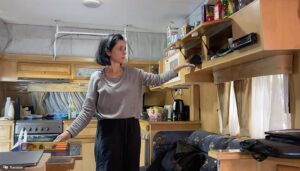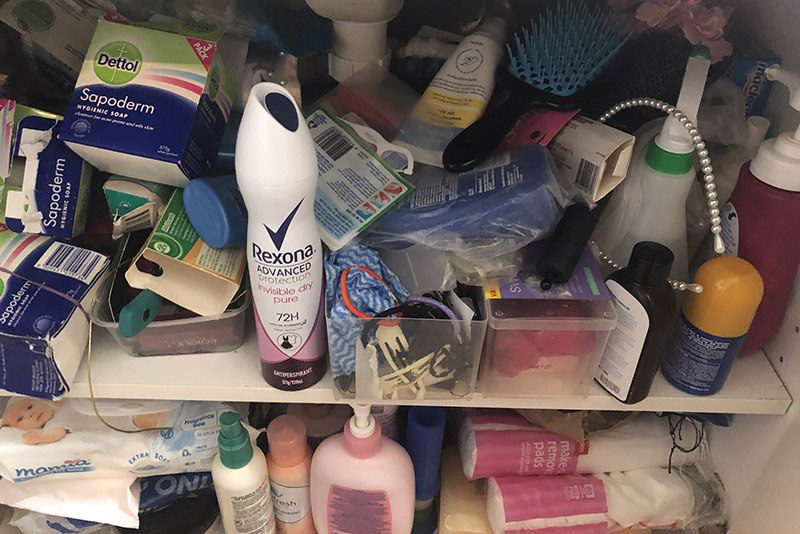
Items retirees should declutter – but what and how.
There are no rules about what you should do or own at a certain age and stage. If you want to go skiing aged 75 – awesome! The lift tickets are free after all.
But if you’re not skiing any more, storing skis should be reconsidered. Space is a finite resource, and retiring is a great time to thin out your stash. The practice of Swedish Death Cleaning addresses the problem of leaving a mess when we die, for others to deal with.
However let’s not get all morbid here – there are decades of relaxation ahead of you, and you shouldn’t have to endure overflowing cupboards and rooms full of clutter.
After all, you could pack up and travel, and rent out your house. Downsize and live near the beach. Chill out and take up yoga. Living more minimally means freedom. Retirees should declutter to embrace the opportunities that await.
So where to start?
Technology
TVs are cheap now, so there is no need to hold on to bulky old units that can’t do much. It’s time to say goodbye to the monster in the spare room that has not been turned on for ten years.
How: Op shops are unlikely to take it, but it may be donatable via Facebook groups like Good Karma, Buy Nothing and Marketplace. If it doesn’t work, there are council E-waste recycling programs – usually at the tip.
Video and audio cassettes. We often keep these because they contain memories. But what’s the point if you don’t have a working device to play them with? Pick a couple of faves and have them converted to a modern format, but retirees should declutter the tapes containing nothing but episodes of The Wonder Years.
How: Movies and box sets are donatable to larger op shops like Savers. Some of them are even sellable. Otherwise many council recycling programs will take them.
That old video camcorder is also redundant. You aren’t going to be dusting it off any time soon.
How: Facebook groups like Good Karma and Buy Nothing enjoy these. Op shops may or may not accept them – you can ask.
Random cords and chargers. If they are not in use, they are probably related to tech or appliances from the past. If in doubt, bag it up and put a date on the bag. Whatever remains in the bag in a year, can go.
How: Council E-waste programs, as well as some major supermarkets which may have an E-waste disposal bin.
Old phones are in the same boat. “But there may be photos on it!” I hear you cry. Are you ever going to get around to booting up the Nokia from 15 years ago? It’s probably near impossible anyway.
How: Council E-waste and supermarkets.
Also retirees should declutter old software – Windows 95 is too ancient to hang onto.
How: Discs can usually go in a designated council recycling program, and packaging into your landfill and recycling bins.
Kitchen and dining
Niche appliances were fun for about a week after purchase, but do you really use all the donut and pie makers now?
How: Most of the larger op shops accept electrical goods if they are functional – otherwise council E-waste.
Excess platters and serving items were useful back in the day – but if hosting big dinners is a thing of the past, retirees should declutter this stuff. Ditto for multiples of crockery.
How: Op shops
Old spices and ingredients. You probably know what staples you like to cook, and won’t use the ground cumin which expired in 2005. As for the sachets that come with your meal delivery service – I know they seem handy but they are just clutter.
How: Put the contents in compost and the jars in your recycling bin.
Tupperware, lunch boxes and drink bottles are not in use like they were when you had a full house. Go through your stash, match everything up with lids and chuck the orphans in the recycling bin (if the recycling code checks out).
How: Donate anything intact to the op shops. The rest is rubbish or recycling.
Fine china. Use it or lose it. It can be lovely to drink from, but otherwise, let someone else enjoy it.
How: Complete sets and valuable pieces can be sold online, or taken to op shops. Savers passes on chipped pieces to Smash Rooms, so don’t be deterred if it’s not perfect.
Bathroom
Toiletries samples and freebies. The shampoos and conditioners you get in hotels are rarely as nice as your chosen brands, so they accumulate unnecessarily.
How: Blessing Bags and Pinchapoo gladly accept these for people in need.
Old makeup is sitting unused for a reason. You know what works for you, and it’s not that.
How: Makeup empties can go to Priceline’s Terracycle program instore.
Expired medications. Retirees should declutter this. Antibiotics from 1998 are no good for anyone. Clear the excess and you will be able to find what you need, when you need it.
How: Your chemist can usually dispose of these safely, so they don’t end up in the waterways.
Living room
Ornaments are pretty daggy these days. One or two favourites can look cute, but I bet you don’t get much joy from huge collections which attract loads of dust. Retirees should declutter their collection to do less housework.
How: Op shops are fine with these.
Books and magazines often build up over time. Unless you are someone who re-reads, it’s time for a cull. And even then, I’ll bet you don’t need them all.
How: Op shops (but ask first), local street libraries (depending on volume), Facebook freebie groups. The last resort is the recycling bin – especially the mags.
Board Games were great many years ago, but If that time has passed for you, let the clutter go. By all means, keep a couple of classics, but the rest will be collecting dust.
How: Op shops – unless there are parts missing in which case do everyone a favour and pop them in the bin.
Bedrooms
Preserving your kids’ bedrooms as though they are still teenagers is unnecessary. They don’t want their old Britney Spears posters, so why should you?
Speaking of children who have moved out, they have no claim on your space. If a box of school memorabilia was not important enough for them to take, it’s not a priority for them. So why should it be for you? Give them a warning and let them know you are decluttering.
How: Op shops, rubbish bin, recycling bin depending what the items are.
Your uncomfortable shoes can go. Life is too short for these.
How: Op shops.
Likewise clothes from a different stage of life. Unless you have kids who want your wedding or formal gowns, it’s unlikely you will need them.
How: Corporate gear from old workplaces can go to Dress for Success or Fitted for Work. Angel Gowns takes wedding dresses and turns them into funeral gowns for deceased babies. The rest is fine for op shops, or The SCR Group donation bins.
Jewellery is great if you are using it, but otherwise it’s a magnet for burglars. Heirloom pieces that don’t suit you any more – can you pass them on to loved ones? And junky pieces from the 90s can be more liberally donated.
How: Family, friends, online selling and last resort is the op shops.
Garage
Dusty, rusty sports equipment can be donated. If you haven’t played squash for 20 years, now is not the time to recommence. It’s pretty brutal on the joints.
How: Op shop
Tools that are never used are something retirees should declutter. Are you planning to use that outdated power drill? If you have been outsourcing certain jobs to a trusted handyman / gardener / plumber for years, there is no turning back.
How: Op shop or Facebook groups like Buy Nothing or Good Karma.
Additional cars are expensive to register and keep. Declutter them. The good news is that ridesharing and car sharing platforms are easily accessible if you occasionally need another set of wheels.
How: Use a vehicle selling platform in your area, or ask a car dealership.
Camping gear. Can you imagine taking your 50 year old tent into the great outdoors and hoping it still works? Nah, didn’t think so.
How: Online donation platforms like Buy Nothing and Good Karma might be the answer.
Miscellaneous
Phone books – one or two could be handy in case of tech failure or propping up a laptop for a Zoom call, but retirees should declutter the rest.
How: Recycling bin
Luggage has a tendency to accumulate. We get new suitcases and retain all the old ones. Just keep the few items you actually use.
How: Op shops and local online groups are likely candidates.
Prescription glasses. Once you have upgraded your prescription, there’s no going back.
How: Your local glasses retailer will often recycle them for you, possibly by sending them overseas to a worthy charity.
Xrays and scans. I see heaps of these in people’s homes. You don’t need an ongoing journal of your bones and muscles. An exception might be if you have a medical court case underway.
How: Councils usually have a recycling program for these.
Old bedding and mattresses can be culled now that life is simpler. The old stuff often has a weird smell. Oh and by the way, those frilled things that sit under your mattress are very 40 years ago.
How: Vets and animal rescues like old towels and sometimes sheets. Pillows and doonas are bin-only (the feathers may be compostable) Mattresses can usually be collected by the council.
Office supplies. Gone are the days when we would work our way through large supplies of paper, folders and Liquid Paper. Curate your stock down to a few basics.
How: Some op shops may take these, but your best bet is to find someone in the community via a Facebook Buy Nothing style group.
Storage units. Decluttering a storage unit is a great way to save money for retirement. One less bill to pay and a whole lot less mental energy. Keeping track of stuff spread across multiple locations is taxing.
How: A mixture of all of the above depending on the contents.
Conclusion
Retirees should declutter their entire home to get ready for adventure and relaxation.
What are you waiting for?


